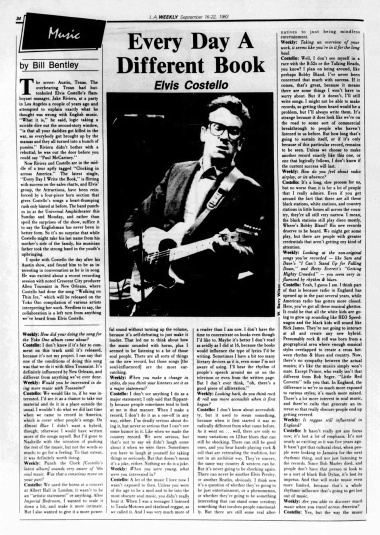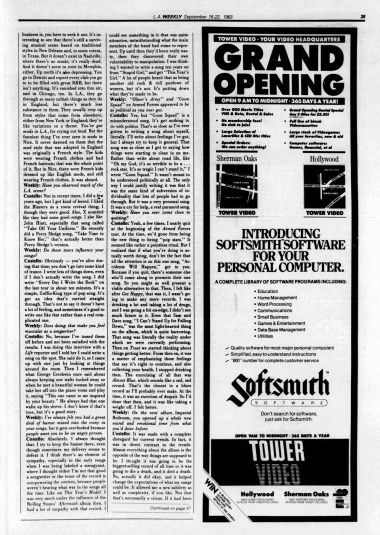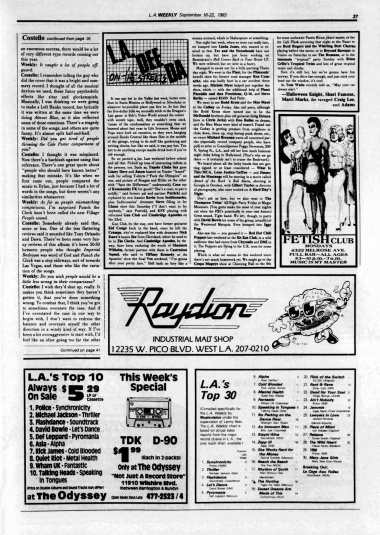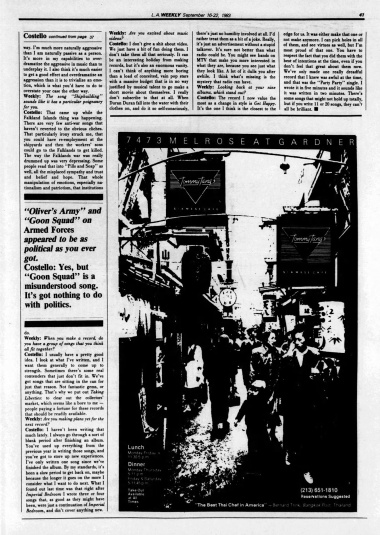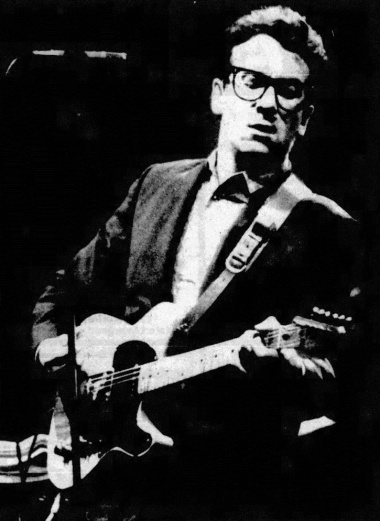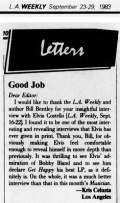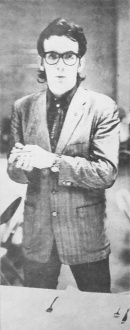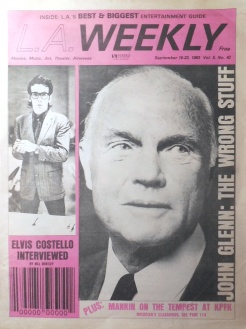|
The scene: Austin, Texas. The overbearing Texan had buttonholed Elvis Costello's flamboyant manager, Jake Riviera, at a party in Los Angeles a couple of years ago and attempted to explain exactly what he thought was wrong with English music. What it is," he said, logic taking a suicide dive out the second-story window, "is that all your daddies got killed in the war, so everybody got brought up by the mamas and they all turned into a bunch of pussies." Riviera didn't bother with a rebuttal; he was out the door before you could say "Paul McCartney."
Now Riviera and Costello are in the middle of a tour aptly tagged "Clocking in across America." The latest single, "Everyday I Write the Book," is flirting with success on the sales charts, and Elvis' group, the Attractions, have been reinforced by a four-piece horn section that gives Costello's songs a heart-thumping rush only hinted at before. The band punches in at the Universal Amphitheatre this Sunday and Monday, and rather than spoil the surprises of the show, suffice it to say the Englishman has never been in better form. So it's no surprise that while Costello might take his last name from his mother's side of the family, his musician father took the strong hand in the youth's upbringing.
I spoke with Costello the day after his Austin show, and found him to be as interesting in conversation as he is in song. He was excited about a recent recording session with noted Crescent City producer Allen Toussaint in New Orleans, where Costello had done the song "Walking on Thin Ice," which will be released on the Yoko Ono compilation of various artists interpreting her work. Needless to say, the collaboration is a left turn from anything we've heard from Elvis Costello.
How did your doing the song for the Yoko Ono album come about?
I don't know if it's fair to comment on this track until it's released, because it's not my project. I can say that one of the conditions of doing this song was that we do it with Allen Toussaint. It's definitely influenced by New Orleans, and different from anything we've ever done.
Would you be interested in doing more music with Toussaint?
We would like to, if he was interested. I'd see it as a chance to take our material and do it in a place outside the usual. I wouldn't do what we did last time when we came to record in America, which is cover other people's songs. On Almost Blue I didn't want a hybrid, though; otherwise I would have written more of the songs myself. But I'd gone to Nashville with the intention of pushing the rest of the music, but not the words so much; to go for a feeling. To that extent, it was definitely worth doing.
Punch the Clock [Costello's latest album] sounds very aware of 60s soul music. Was that a conscious move on your part?
We used the horns at a concert at Albert Hall in London; it wasn't to be an "artistic statement" or anything. After Imperial Bedroom, I wanted to scale it down a bit, and make it more intimate. But I also wanted to give it a more powerful sound without turning up the volume, because it's self-defeating to just make it louder. That led me to think about how the music sounded with horns, plus I seemed to be listening to a lot of those soul people. There are all sorts of things on the new record, but those songs [the soul influenced] are the most ear-catching.
When you make a change in styles, do you think your listeners see it as a major statement?
I don't see anything I do as a major statement; I only said that flippantly because people sometimes tend to look at me in that manner. When I make a record, I don't do it as a one-off in any way, either. I'm deadly serious about doing it, but never so serious that I can't see some humor in it. Like when we made the country record. We were serious, but that's not to say we didn't laugh some about it when we were there. Sometimes you have to laugh at yourself for taking things so seriously. But that doesn't mean it's a joke, either. Nothing we do is a joke.
When you were young, what were you interested in?
A lot of the music I love now I wasn't exposed to then. Unless you were of the age to be a mod and to be into the most obscure soul music, you didn't really hear it. When I was a teenager I listened to Tamla-Motown and skinhead reggae, as we called it. And I was very much more of a reader than I am now. I don't have the time to concentrate on books even though I'd like to. Maybe it's better I don't read as avidly as I did at 16, because the books would influence the type of lyrics I'd be writing. Sometimes I have a bit too many literary devices as it is, even some I'm not aware of using. I'll hear the rhythm of people's speech around me or on the television or even from the written page. But I don't ever think, "oh, there's a good piece of alliteration."
Looking back, do you think rock & roll was more accessible when it first began?
I don't know about accessibility, but it used to mean something, because when it first started it was so radically different from what came before. As it went on... well, there are only so many variations on 12-bar blues that can still be shocking. There can still be good ones, and you hear bands playing rock & roll that are retreading the tradition, but not in an archivist way. They're sincere, the same way country & western can be. But it's never going to be shocking again. There can never be another Elvis Presley, or another Beatles, obviously. I think now it's a question of whether they're going to be just entertainment, or a phenomenon, or whether they're going to be something interesting that can stand some scrutiny; something that involves people emotionally. But there are still some real alternatives to just being mindless entertainment.
Taking an overview of your work, it seems like you're in it for the long haul.
Well, I don't see myself in a race with the B-52s or the Talking Heads, you know? I plan on being around, like perhaps Bobby Bland. I've never been concerned that much with success. If it comes, that's great, because it means there are some things I won't have to worry about. But if it doesn't, I'll still write songs. I might not be able to make records, so getting them heard would be a problem, but I'll always write them. It's strange because it does look like we're on the road to some sort of commercial breakthrough to people who haven't listened to us before. But how long that's going to sustain itself, or if it's only because of this particular record, remains to be seen. Unless we choose to make another record exactly like this one, or one that logically follows, I don't know if the current success will last.
How do you feel about radio airplay, or its absence?
It's a long, slow process for us, but no worse than it is for a lot of people that I really admire. Even if you get around the fact that there are all these black stations, white stations, and country stations in little boxes all across the country, they're all still very narrow. I mean, the black stations still play disco mostly. Where's Bobby Bland? His new records deserve to be heard. We might get some play, but there are people with greater credentials that aren't getting any kind of attention.
Looking at the non-original songs you've recorded — like Sam & Dave's "I Can't Stand Up for Falling Down," and Betty Everett's "Getting Mighty Crowded" — you seem very influenced by rhythm & blues.
Yeah, I guess I am. I think part of that is because radio in England has opened up in the past several years, while American radio has gotten more closed. Here, you've got all these musical ghettos. It could be that all the white kids are going to grow up sounding like REO Speedwagon and the black kids will sound like Rick James. They're not going to interact at all and create any new hybrid. Presumably rock & roll was born from a geographical area where enough musical styles overlapped to create a cross between rhythm & blues and country. Now, there's no sympathy between the actual musics; it's like the musics simply won't mate. Except Prince, who really isn't that different from Bob Seger. "Little Red Corvette" tells you that. In England, the difference is we're so much more exposed to various styles; it's much more mixed. There's a lot more interest in soul music, and there're cults that generate an interest so that really obscure people end up getting revered.
Is reggae still influential in England?
It hasn't really got any focus now; it's lost a lot of emphasis. It's not nearly as exciting as it was five years ago. It hasn't got that cultural clout, when people were looking to Jamaica for the next rhythmic thing, and not just listening to the records. Since Bob Marley died, and people don't have that person to look to as a sort of black Bob Dylan, it's lost its impetus. And that will make music even more limited, because that's a whole rhythmic influence that's going to get lost out of music.
Are you able to discover much music when you travel across America?
Yes, but the way the music business is, you have to seek it out. It's interesting to see that there's still a surviving musical scene based on traditional styles in New Orleans and, to some extent, in Texas. But it doesn't exist in Nashville, where there's no music; it's really dead. And it doesn't seem to exist in Memphis, either. Up north it's also depressing. You go to Detroit and expect every club you go to to be filled with great R&B, but there isn't anything. It's vanished into thin air, and in Chicago, too. In L.A., they go through as many cultish things as they do in England, but there's much less substance in them. They usually crop up from styles that come from elsewhere, either from New York or England; they're like variations on a theme. You've got mods in L.A., for crying out loud. But the funniest thing I've ever seen is mods in Nice. It never dawned on them that the mod style that was adopted in England was originally a French style. The kids were wearing French clothes and had French haircuts; that was the whole point of it. But in Nice, there were French kids dressed up like English mods, and still wearing French clothes. It was absurd.
Have you observed much of the L.A. scene?
Not in recent times. I did a few years ago, but I got kind of bored. I liked the Blasters as a roots revival thing; I thought they were good. Also, X sounded like they had some good songs. I also like John Hiatt, especially that song called "Take Off Your Uniform." He recently did a Percy Sledge song, "Take Time to Know Her," that's actually better than Percy Sledge's version.
Do these tours influence your songs?
Obviously — you're alive during that time; you don't go into some kind of trance. I write lots of things down, even if I don't actually write the song. I did write "Everyday I Write the Book" on the last tour in about ten minutes. It's a simple, Goffin-King type of pop song. It's got an idea that's carried straight through. That's not to say it doesn't have a lot of feeling, and sometimes it's good to write one like that rather than a real complicated one.
Does doing that make you feel muscular as a songwriter?
No, because I've tossed them off before and not been satisfied with the results. I was doing this interview with a Life reporter and I told her I could write a song on the spot. She said do it, so I came up with one just by looking at things around the room. Then I remembered what George Gershwin once said about always keeping one waltz tucked away so when he met a beautiful woman he could take her off into the piano room and play it, saying "This one came to me inspired by your beauty." He always had that one waltz up his sleeve. I don't know if that's true, but it's a good story.
I've always felt you had a great deal of humor mixed into the irony in your songs, but it gets overlooked because people want you to be an angry person.
Absolutely. I always thought that. I try to keep the humor there, even though sometimes my delivery seems to defeat it. I think there's an element of sympathy, especially in the early songs when I was being labeled a misogynist, where I thought either I'm not that good a songwriter or the tenor of the record is overpowering the content, because people weren't hearing what was in the songs all the time. Like on This Year's Model. I was very much under the influence of the Rolling Stones' Aftermath album then. I had a lot of empathy with that record. I could see something in it that was quite attractive, notwithstanding what the main members of the band had come to represent. Up until then they'd been really nasty, then they discovered their own vulnerability to manipulation. I was thinking I wanted to write a song ten years on from "Stupid Girl," and got "This Year's Girl." A lot of people heard that as being another old rock & roll putdown of women, but it's not. It's putting down what they're made to be.
"Oliver's Army" and "Goon Squad" on Armed Forces appeared to be as political as you ever got.
Yes, but "Goon Squad" is a misunderstood song. It's got nothing to do with politics. That's as close as I've ever gotten to writing a song about myself, literally. I'll write about feelings I've got, but I always try to keep it general. That song was as close as I got to saying how things were starting to close in on me. Rather than write about road life, like "Oh my God, it's so terrible to be a... rock star. It's so tragic I can't stand it," I wrote "Goon Squad." It wasn't meant to be understood politically at all. The only way I could justify writing it was that it was the same kind of subversion of individuality that lots of people had to go through. But it was a very personal song. It was a cry for help, a real paranoid song.
Have you ever come close to quitting?
Yeah, a few times. I nearly quit at the beginning of the Armed Forces tour. At the time, we'd gone from being the new thing to being "pop stars." It seemed like rather a pointless ritual. But I realized that if what you're doing is actually worth doing, don't let the fact that all the attention is on this one song, "Accidents Will Happen," get to you. Because if you quit, there's someone else who'll come along to promote their one song. So you might as well present a viable alternative to that. Then, I felt like after Get Happy!!, that was it, I wasn't going to make any more records. I was drinking a lot and taking a lot of drugs, and I was going a bit on-edge; I didn't see much future in it. Even that Sam & Dave song, "I Can't Stand Up for Falling Down," was the most lighthearted thing on the album, which is quite harrowing. That song was literally the reality under which we were currently performing. Then on Trust we started thinking about things getting better. From then on, it was a matter of emphasizing those feelings that say it's right to continue, and also collecting your health. I stopped drinking then. The exorcising of all that was Almost Blue, which sounds like a sad, sad record. That's the closest to a blues record as I'll probably ever make. At the time, it was an exorcism of despair. So I'd done that then, and it was like taking a weight off. I felt better.
On the next album, Imperial Bedroom, you opened up a whole new sound and emotional tone from what you'd done before.
It was made with a complete disregard for current trends. In fact, it was in direct contrast to the trends. Almost everything about the album is the opposite of the way things are supposed to be. I thought it was going to be the biggest-selling record of all time or it was going to die a death, and it died a death. No, actually it did okay, and it helped change the expectations of what my songs could be. It allowed me a new subtlety as well as complexity, if you like. Not that that's necessarily a virtue. If it had been an enormous success, there would be a lot of very different type records coming out this year.
It caught a lot of people off guard.
I remember telling the guy who did the cover that it was a bright and summery record. I thought of all the musical devices we used, those funny psychedelic effects like sitar and glockenspiels. Musically, I was thinking we were going to make a Left Banke record, but lyrically it was written at the same time we were doing Almost Blue, so it also reflected some of those emotions. There's a tragedy in some of the songs, and others are quite funny. It's almost split half-and-half.
Did you get tired of people throwing the Cole Porter comparisons of you?
I thought it was misplaced. Now there's a backlash against using that reference. There's one great quote about "people who should have known better', making that mistake. It's like when we first came out, people compared the music to Dylan, just because I had a lot of words in the songs, but there weren't any similarities whatsoever.
As far as people mismatching comparisons, I'm surprised Punch the Clock hasn't been called the new Village People sound.
Somebody already said that, more or less. One of the less flattering reviews said it sounded like Tony Orlando and Dawn. There've been some very funny reviews of this album; it's been 50-50 between people who thought Imperial Bedroom was word of God and Punch the Clock was a step sideways, sort of towards Las Vegas, and those who like the variation of the songs.
Do you wish people would be a little less wrong in their comparisons?
I wish they'd shut up, really. It makes you think sometimes they haven't gotten it, that you've done something wrong. To combat that, I think you've got to sometimes overstate the case. And if I've overstated the case in one way to begin with, I don't want to redress the balance and overstate myself the other direction in a windy kind of way. If I've been a bit overaggressive to start with, I'd feel like an idiot going too far the other way. I'm much more naturally aggressive than I am naturally passive as a person. It's more in my capabilities to overdramatize the aggressive in music than to underplay it. I also think it's much easier to get a good effect and overdramatize an aggression than it is to trivialize an emotion, which is what you'd have to do to overstate your case the other way.
The song "Shipbuilding" sounds like it has a particular poignancy for you.
That came up while the Falkland Islands thing was happening. There are very few anti-war songs that haven't reverted to the obvious cliches. That particularly irony struck me, that you could have re-employment at the shipyards and then the workers' sons could go to the Falklands to get killed. The way the Falklands war was really drummed up was very depressing. Some people read that into "Pills and Soap" as well, all the misplaced sympathy and trust and belief and hope. That whole manipulation of emotions, especially nationalism and patriotism, that institutions do.
When you make a record, do you have a group of songs that you think all fit together?
I usually have a pretty good idea. I look at what I've written, and I want them generally to come up to strength. Sometimes there's some real contenders that just don't fit in. We've got songs that are sitting in the can for just that reason. Not fantastic gems, or anything. That's why we put out Taking Liberties: to clear out the collectors' market, which seems like a bore to me people paying a fortune for these records that should be readily available.
Are you making plans yet for the next record?
I haven't been writing that much lately. I always go through a sort of blank period after finishing an album. You've used up everything from the previous year in writing those songs, and you've got to store up new experiences. I've only written one song since we've finished the album. By my standards, it's been a slow period to get back on, maybe because the longer it goes on the more I consider what I want to do next. What I found out last time was that right after Imperial Bedroom I wrote three or four songs that, as good as they might have been, were just a continuation of Imperial Bedroom, and didn't cover anything new.
Are you excited about music videos?
I don't give a shit about video. We just have a bit of fun doing them. I don't take them all that seriously. It can be an interesting holiday from making records, but it's also an enormous vanity. I can't think of anything more boring than a load of conceited, vain pop stars with a massive budget that is in no way justified by musical talent to go make a short movie about themselves. I really don't subscribe to that at all. When Duran Duran fall into the water with their clothes on, and do it so self-consciously, there's just no humility involved at all. I'd rather treat them as a bit of a joke. Really, it's just an advertisement without a stupid talkover. It's sure not better than what radio could be. You might see bands on MTV that make you more interested in what they are, because you see just what they look like. A lot of it dulls you after awhile. I think what's missing is the mystery that radio can have.
Looking back at your nine albums, which stand out?
The record I now value the most as a change in style is Get Happy!! It's the one I think is the closest to the edge for us. It was either make that one or not make. anymore. I can pick holes in all of them, and see virtues as well, but I'm most proud of that one. You have to respect the fact that you did them with the best of intentions at the time, even if you don't feel that great about them now. We've only made one really dreadful record that I knew was awful at the time, and that was the "Party Party" single. I wrote it in five minutes and it sounds like it was written in two minutes. There's some songs that might not hold up totally, but if you write 11 or 20 songs, they can't all be brilliant.
| 